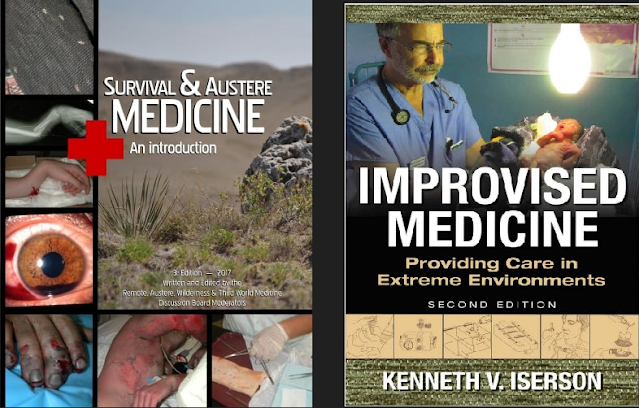Survival and Improvised Medicine in Austere Environments
“With no antibiotics there would be no treatment for bacterial infections; pneumonia or a simple cut could kill again, contagious diseases (including those sexually transmitted) would make a come back, and high mortality rates would be associated with any surgery. Poor hygiene and disrupted water supplies would lead to an increase in diseases such as typhoid and cholera. Without vaccines there would be a progressive return in infectious diseases such as polio, tetanus, whooping cough, diphtheria, mumps, etc. especially among children. People suffering from chronic illnesses such as asthma, diabetes, or epilepsy would be severely affected with many dying (especially insulin-dependent diabetics). There would be no anesthetic agents resulting in return to tortuous surgical procedures with the patient awake or if they were lucky drunk or stoned. The same would apply to painkillers; a broken leg would be agony, and dying of cancer would be distressing for the patient and their family. Without reliable oral contraceptives or condoms the pregnancy rate would rise and with it the maternal and neonatal death rates, women would die during pregnancy and delivery again, and premature babies would die. Women would still seek abortions, and without proper instruments or antibiotics death from septic abortion would be common again. In the absence of proper dental care teeth would rot, and painful extractions would have to be performed. What limited medical supplies available would have to be recycled, resulting in increasing risks of hepatitis and HIV infection.”
Unlike paramedics, who are trained to expect the unexpected, most other health care professionals (including physicians, dentists, podiatrists, physician assistants, and nurse practitioners) who work in high-tech health care systems don’t expect that the power will fail, a fire will ignite, the computer system will crash, a flood will inundate their facility, or an epidemic will erupt. Yet these events occur on a routine basis and, given the state of the world, it is likely they will occur more frequently in the future.
Survival medicine is: "The practice of medicine in an environment or situation where standard medical care and facilities are unavailable, often by persons with no formal medical training". This includes medical care while trekking in third world countries, deep-water ocean sailing, isolated tramping and trekking, and following a large natural disaster or other catastrophe. The basic assumption is that trained doctors and hospital care will be unavailable for a prolonged period of time, and that in addition to providing first aid - definitive medical care and rehabilitation (if required) will need to be provided. Also the basics of personal and public hygiene will also need to be considered. Austere medicine is the provision of medical care without access to modern investigations or technology.
Improvised medicine encompasses a spectrum of ad hoc equipment, and special methods and knowledge for advanced health care practitioners who already work capably within their own areas of expertise. Use Improvised Medicine when, due to prevailing circumstances, you must reach beyond your comfort level and provide medical care usually provided by other specialists—or without the medications, equipment, and milieu to which you have become accustomed.
Survival and Austere Medicine, 3Ed
Improvised Medicine: Providing Care in Extreme Environments, 2Ed
Austere Emergency Medical Support (AEMS) Field Guide
Where There Is No Doctor
This handbook has been written primarily for those who live far from medical centers, in places where there is no doctor. But even where there are doctors, people can and should take the lead in their own health care. A PDF of the 2011 version of Where There Is No Doctor (503 pages) is available on-line. A hard copy version can also ordered from the publisher.
The Ship's Medicine Chest and Medical Aid At Sea
The Ship’s Medicine Chest and Medical Aid at Sea is published primarily for the information and guidance of the Master and other licensed and certified crew members who may be directly or indirectly responsible for the administration of medical treatment at sea on vessels which do not carry a physician. This book attempts to describe in nontechnical language, the diseases and medical emergencies most commonly encountered while at sea and the "first aid" and "follow-up" care required until the patient can be evaluated and treated by a physician.


.png)


Comments
Post a Comment